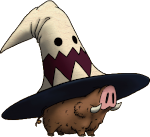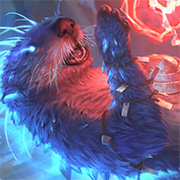|
moths posted:I assume you mean an established world - There 's a ton of collaborative world-building baked into the system. This is really emphasized in the organized play, but one of your character's traits is literally your One Unique Thing. It's not collective world-building if you are given an almost bog-standard D&D world as the baseline to work with. Also, making your One Unique Thing "no one else is allowed to use this basic game/world building block" is a hilariously bad misinterpretation of that mechanic that also manages to ignore what 13A lore does exist. If you are making your own network of icons and doing everything from scratch, sure. But you can do that with any game. Dungeon World is actual world-building, because it is designed so that you make up the entire world as you go along in play (no autistic GM-only design doc required--after the first session, your group can share in the autism). The GM can entirely hand you the plot if he wants, and if you succeed on a check, the GM encourages you to describe why you did. E: Maybe "hilariously bad" is harsh, but you're dramatically misinterpreting what the mechanic is actually telling you to do. Name Change fucked around with this message at 22:01 on Jan 8, 2016 |
|
|
|

|
| # ? May 30, 2024 19:11 |
|
OneThousandMonkeys posted:13A is great if you want a new-school system that values balance at the table, but still don't expect any interesting world-building. With that you're really on your own. as opposed to the cornucopia of indescribable wonders that is the Sword Coast
|
|
|
|
Really Pants posted:as opposed to the cornucopia of indescribable wonders that is the Sword Coast I'm not making value judgments on D&D, which I would be less charitable on, with that assessment.
|
|
|
|
OneThousandMonkeys posted:13A is great if you want a new-school system that values balance at the table, but still don't expect any interesting world-building. I wouldn't say that 13A is really balanced. It has some interesting ideas, but it's hamstrung by trying to not go too far from old ideas. I mean, it's better balanced than 5e, but, like
|
|
|
|
OneThousandMonkeys posted:I'm not making value judgments on D&D, which I would be less charitable on, with that assessment. Sorry, I didn't mean to imply you were, it's just that anything would be an improvement.
|
|
|
|
I GM'd a couple sessions of 13th Age for some friends while we were camped out at a lakehouse over New Years. None of us had played it before, but we all had a blast. I personally felt combat was substantially better than D&D 5e; it had better pacing with each combat starting out with players at a disadvantage and slowly gaining an edge on the enemies, it was more interesting because nobody chose a class that was Swords McStabsman or Bow McShootsman (though Barbarian and Ranger look to be just that), and combat had quite a bit more tension because enemies are more free to move about the battlefield and everyone was eagerly waiting to see if attack rolls were even/odd/11+/16+/hit/miss to see which effects proc'd. We had a Cleric, Bard/Wizard, and Sorcerer. They all felt pretty balanced, with the Bard being the lowest consistent damage, but could rain death a couple times per day and toss out heals like none other. Like I said though, Barbarian and Ranger look boring a terrible. I've got a 5e campaign I'm running with a separate group, and I was starting to get really sick of the rocket tag most combat turns into. As the GM, I know I had more fun in combat during our few sessions of 13th Age than I have in pretty much all my 5e campaign. Worldbuilding felt the exact same though. In 13th Age you have all your Icons that you fit into your story; in D&D you have all the deities/planes that you fit into your story. It seemed like a wash to me. The Icon Relationships seemed interesting but, possibly due to inexperience with them, we found them hard to make relevant. ("Cool, you rolled a 6 on your relationship with the Great Gold Wyrm. Well, you are halfway through a Lich King dungeon right now so ???"). Similar issue with the One Unique Thing mechanic. It was nice that they existed, but we didn't find a good method for making them relevant during gameplay.
|
|
|
|
fool_of_sound posted:I'd definitely give it a look. My experience with the way 5e is actually played across my own game and several of my friends' is that it plays much like a less structured, less interesting version of 13th Age. I haven't played 13th Age but I finally got around to reading the book a few weeks back, and "a more structured more interesting 5e" is pretty much in line with my impression of how it'd play.
|
|
|
|
Duct Tape posted:"Cool, you rolled a 6 on your relationship with the Great Gold Wyrm. Well, you are halfway through a Lich King dungeon right now so ???" Are you rolling those every session? I've played in a few games that used 13A icon dice, and the icon dice would usually be rolled at the end of some session, and the DM would use them to kinda plot out a few events that occurred over the next few sessions.Then, when you know you're in a Lich King dungeon and you have a 6 for the Great Gold Wyrm, maybe you find a captured follower of Goldy who gives you some important information and tells you how to approach The Big Fight or something. Or, it's a completely different thing that's addressed some other session. Have them reroll once you've finished all the stuff you've already set up from the previous rolls.
|
|
|
|
Hitlers Gay Secret posted:Last time I played 5e we had one character have to make multiple survival checks to start a fire on a bush. My druid thought it was so funny that it took so long that after he was finished I cast produce flame and set fire to another bush, and we ended up starting a brush fire. What type of terrible DM would even have a player go through with that?
|
|
|
|
Gharbad the Weak posted:Are you rolling those every session? I've played in a few games that used 13A icon dice, and the icon dice would usually be rolled at the end of some session, and the DM would use them to kinda plot out a few events that occurred over the next few sessions.Then, when you know you're in a Lich King dungeon and you have a 6 for the Great Gold Wyrm, maybe you find a captured follower of Goldy who gives you some important information and tells you how to approach The Big Fight or something. Or, it's a completely different thing that's addressed some other session. Have them reroll once you've finished all the stuff you've already set up from the previous rolls. We were rolling them at the beginning of the session, and from the way I was interpreting the book, I was supposed to make relationship that rolled 5s and 6s relevant for that session. So it was pretty difficult to improvise how potentially half a dozen different icons were all relevant to the current situation with no time to prepare, while making sure it didn't stomp on other plans or story elements. Rolling at the end of the session and/or having the effect be revealed over the next few sessions and then rerolled, both sound like better versions of what I was trying to do. I'll give that a shot next time we play.
|
|
|
|
Duct Tape posted:We were rolling them at the beginning of the session, and from the way I was interpreting the book, I was supposed to make relationship that rolled 5s and 6s relevant for that session. So it was pretty difficult to improvise how potentially half a dozen different icons were all relevant to the current situation with no time to prepare, while making sure it didn't stomp on other plans or story elements. Yeah, that's how I'm going to do it the next time I play 13th Age. Rolling them every session (at the end, for us) just led to me having to shoehorn in a lot of icon roll results in unsatisfying or half-baked ways every session. Rolling every few sessions, maybe a couple times per "chapter" of the story, would make more sense and be a lot easier to work with. That said, there were still players who almost never turned up anything on their icon dice, so depending on how rarely I have them roll I might make it easier to get a result.
|
|
|
|
OneThousandMonkeys posted:It's not collective world-building if you are given an almost bog-standard D&D world as the baseline to work with. Also, making your One Unique Thing "no one else is allowed to use this basic game/world building block" is a hilariously bad misinterpretation of that mechanic that also manages to ignore what 13A lore does exist. Seriously the other side of having a unique thing is that nobody else has it. That's not explicitly spelled out and it may not even be intentional, but it's there. Here's an excerpt from one of the organized play packs: quote:One Unique Things Again, they're telling you not to do "Only" uniques specifically in the organized play format. Players also have substantial input on the game world with their backgrounds - If they take backgrounds like "Strong +5" no, that's not developing anything. But if they take "Strongman in the travelling Imperial Army Circus +5" they're telling you that the Dragon Emperor has an army, it has a travelling circus, and the character was a performing strong man in it. But more importantly, they're telling you that that's an aspect of the game world they want to interact with. That's more valuable to a GM than all the Volo's guides to the Men's Rooms of the Underdark becasue The 13A setting is deliberately broad strokes and sketches because you and your players are supposed to flesh it out through play. The same packet gives this example: quote:Statements about the world Again, the game encourages the DM to answer questions with "Yes, and..." and "I don't know, you tell me..." stuff. It's fantastic when you see players actually collaborate and contribute. I'd seriously recommend any 13A Organized Play in any list of good GMing resources - there's a section of GM advice that's primarily oriented towards 13A's flexible setting, but it's a good read for anyone who isn't opposed to on-the-fly worldbuilding.
|
|
|
|
There will be an AMA with Mike Mearls and other WOTC folks at 10am PST (GMT-8) on Friday the 15th of January
|
|
|
|
This is a lot of 13A chat for the 5E thread, but:moths posted:Seriously the other side of having a unique thing is that nobody else has it. That's not explicitly spelled out and it may not even be intentional, but it's there. Here's an excerpt from one of the organized play packs: Somehow you confused "Don't do this because it's dumb and hackneyed" with "Only don't do it in organized play." Nothing exclusionary like this is even put forward as a 'one unique thing' anywhere in the book, and that's not by accident. As far as 13th Age being collaborative, OK. That doesn't come through effectively in the core book at all, which kicks off with the icons. (Can we at least agree the icon system is clunky?) Very little attention is paid to the concept that you can do whatever you want with the game. One of the outstanding issues with 13A seems to me that it doesn't come out and say what it is. Everything is a suggestion, a maybe, or an incomplete idea, but it still puts forth its gameworld as the first thing to look at in the core book, which matters a lot more than web supplements or what have you. By the bye, organized play is diametrically opposed to the concept of on-the-fly world-building. You literally can't do that in organized play, or the phrase "organized play" ceases to have real meaning. They'd almost be better off listing numerous example icons, and telling GMs to do something like "Pick three good, three evil, and three it's complicated icons, or make nine of your own along these divisions. These are the influential beings that you and the players can start worldbuilding on." As opposed to giving you what looks more or less like Greyhawk and then going "But it's collaborative!" For what it's worth I signed up for organized play just now, just to see what they're up to if nothing else. Our current 13A GM is a grognard who seems to like the system less and less with each passing week.
|
|
|
|
OneThousandMonkeys posted:Somehow you confused "Don't do this because it's dumb and hackneyed" with "Only don't do it in organized play." Nothing exclusionary like this is even put forward as a 'one unique thing' anywhere in the book, and that's not by accident. While not as extreme as the examples posted, here are some example exclusionary OUT's from the core book: “Unlike other sorcerers, I charge up my arcane batteries by suffering.” “I’m the only human to be called into the dwarven priesthood—ever.” Not as extreme, but it's still shown as an option you can use with your OUT. OneThousandMonkeys posted:As far as 13th Age being collaborative, OK. That doesn't come through effectively in the core book at all, which kicks off with the icons. (Can we at least agree the icon system is clunky?) Very little attention is paid to the concept that you can do whatever you want with the game. Everything being a suggestion is 100% intentional and an advantage of the system, not an outstanding issue. This gets expanded upon more in some of the other core books (especially the Bestiary, which might be the best book in the line), but they want to give you multiple plot-hooks or reasons so that you can pick whatever inspires you the most. The Dragon Empire is very much not a Greyhawk/FR style setting with everything defined for you. There's a few paragraphs in the core book explaining that most of the map is intentionally left blank so that you can fill in whatever you want! In the Running the Game chapter, there's multiple sections on how to customize and change the icons to suit the needs of your campaign. Additionally, they explain that the system has no gods or pantheon by default, so that each campaign can define their own as needed. It's not a Dungeon World level of complete freedom, but it's a huge step towards it from traditional D&D. Also, organized play can work with on-the-fly world-building just fine (and as mentioned, these packets also have a bunch of advice on how to do so successfully!). 13th Age OP is more about shared adventure (so multiple groups can recount how they defeated X's armies or what have you) over a defined, consistent universe across tables. I've also seen it done where multiple groups in one store will share their world-building moments to create a shared universe, which is super cool. Edit: They've also pushed the custom world-building stuff more in each subsequent book. For a quick example, here's 13 alternative icons they published for free on their website: http://pelgranepress.com/index.php/gender-flipped-icons-in-13th-age/ And here's a more grimdark'd version of the icons as well: http://pelgranepress.com/index.php/the-dragon-empire-through-a-mirror-darkly/ CaptCommy fucked around with this message at 19:49 on Jan 9, 2016 |
|
|
|
I'm running a game of high-level 5E for some old friends of mine this weekend. The PC's will all be 15th level. This will be the first time I've DM'ed 5E, and only the second time I've played it. How useful/useless are the encounter building guidelines in the DMG? I have a general sense from this thread that they are no drat good. If that's true, are there any reliable encounter building guidelines anywhere? I don't want to accidentally TPK the group in the first encounter, but I don't want them to walk all over the monsters in combat either.
|
|
|
|
TheAwfulWaffle posted:I'm running a game of high-level 5E for some old friends of mine this weekend. The PC's will all be 15th level. This will be the first time I've DM'ed 5E, and only the second time I've played it. I've found the experience buy model the DMG uses should more or less get you in the right ballpark, but it will still vary wildly based on your players' style, what kind of shape they're in going into the encounter, what they're good at and specific traits of whatever creatures you're using, so in your case it probably will in fact be a total crapshoot.
|
|
|
|
TheAwfulWaffle posted:I'm running a game of high-level 5E for some old friends of mine this weekend. The PC's will all be 15th level. This will be the first time I've DM'ed 5E, and only the second time I've played it. The encounter building guidelines in the DMG are ... okay, but you need to remember a couple of things: 1. Any individual combat is going to lean on the on the easy side, because the characters are supposed to endure 6 or more of them before taking a Long Rest 2. Use monsters from the monster manual. While the encounter building guidelines are ok, the monster building guidelines are not. 3. At level 15, any spellcaster is going to be hugely powerful, and it's going to throw off the balance of encounters something awful unless you consider what a monster can do. That is, a "Deadly" encounter might not even be deadly at all if it's just large bags of HP that want to run up to the players to multi-attack, end turn. I did write an alternate set of monster building rules that also reduces encounter building to "as many monsters as there are players, of their level", but #3 still applies.
|
|
|
|
A level 15 caster can totally dismantle an encounter with no-save spells like Forcecage or even just Wall of Force, and by the rules you can't do anything about it. So be prepared for that I guess
|
|
|
|
5e SRD? Holy cow, they actually did it. Welp, I lose my bet. http://dnd.wizards.com/articles/features/systems-reference-document-srd --- After taking a look, it seems like a real, full-content SRD, full compliance with the existing OGL, and a new DM's Guild as a sort of replacement for the d20 STL. Wow. I seriously, seriously did not see this coming. I thought the paid licensing model was going to be the extent of it. dwarf74 fucked around with this message at 19:04 on Jan 12, 2016 |
|
|
|
dwarf74 posted:5e SRD? I was just coming here to post this. I'll be interested to hear more from people with more legal/publishing knowledge than I how it looks from that perspective. the DM's Guild thing looks potentially interesting for individuals who just want to sell a few things here and there. (Edit) More on the Dungeon Masters Guild thing: http://dnd.wizards.com/articles/news/dungeon-masters-guild-now-open DrOct fucked around with this message at 19:04 on Jan 12, 2016 |
|
|
|
DrOct posted:I was just coming here to post this. I'll be interested to hear more from people with more legal/publishing knowledge than I how it looks from that perspective. the DM's Guild thing looks potentially interesting for individuals who just want to sell a few things here and there. The designated Product Identity is really, really similar to what it was under 3.x, IIRC. The OGL lets you publish your own stuff, just like always. taking on all costs and profits. The DM's Guild lets you use the Forgotten Realms and WotC's resources. You get 50% of sales; 25% goes to WotC and 25% goes to OBS.
|
|
|
|
Well, that sort of came out of left field. I mean, there were a couple of interviews/statements where they alluded to wanting to do it, but I would've expected a bigger announcement. Anyway, it looks like some class archetypes are not part of the SRD.
|
|
|
|
Why on earth would they go back to SRD? It looks like apathy to me more than anything else.
|
|
|
|
It basically completes the cycle of passing everything back to the community after they outsourced everything else. They don't have anything planned for this year, so homebrews and d20-era shovelware can make up the difference and maintain a level of buzz. Heck, the SRD isn't even an SRD so much as cherry picked sections of the rulebooks.
|
|
|
|
mastershakeman posted:Why on earth would they go back to SRD? It looks like apathy to me more than anything else. They could have called it something else, but calling it the SRD immediately tells its intended audience what it is and what it contains. What else would you expect?
|
|
|
|
gradenko_2000 posted:Anyway, it looks like some class archetypes are not part of the SRD. e: Yeah, since the main class features are all present, I don't think it's a huge deal. What it does, is make it a whole lot harder for someone to publish a $15 'Pocket 5e PHB' which replicates all the PHB content. I have heard WotC was really mad about that back under 3.x, so it makes sense for them to make any new publications a little harder. I don't think it has really much effect at all on mainstream stuff that anyone would actually want to publish that isn't just a straight ripoff. dwarf74 fucked around with this message at 19:43 on Jan 12, 2016 |
|
|
|
So now I hope that Dreamscarred comes in and makes some actually good new classes for 5e like they've been doing for Pathfinder for a while. How long until somebody makes a d20srd/d20pfsrd equivalent for this? It's kind of tempting to do something myself and toss up a Semantic Mediawiki setup or something.
|
|
|
|
Roadie posted:So now I hope that Dreamscarred comes in and makes some actually good new classes for 5e like they've been doing for Pathfinder for a while. It will apparently be 5eSRD.org I think, at least per some rando on ENWorld.
|
|
|
|
Guys you're missing the big picture. We can start designing functional classes and selling them on DTRPG for pennies! We can fix 5th Edition!
|
|
|
|
By doing this they now place the ultimate responsibility for everything in the hands of the consumer. Why aren't there more adventures? Because you guys haven't made them yet. Why aren't there high level monsters? Because you guys haven't made them yet. Hell they can probably just delete wizards.com/dnd and redirect it to a blank white screen with "ASK YOUR DM  " in 94pt Comic Sans. " in 94pt Comic Sans.
|
|
|
|
For someone who doesn't own the rulebooks, would it be possible to run a 5E campaign using just the SRD? Not that I'm planning on it, but I'm curious about how complete it is.
|
|
|
|
dwarf74 posted:e: Yeah, since the main class features are all present, I don't think it's a huge deal. What it does, is make it a whole lot harder for someone to publish a $15 'Pocket 5e PHB' which replicates all the PHB content. I have heard WotC was really mad about that back under 3.x, so it makes sense for them to make any new publications a little harder. I don't think it has really much effect at all on mainstream stuff that anyone would actually want to publish that isn't just a straight ripoff. I didn't follow 3rd party d20 stuff that closeley, so I'll ask a question that probably has an obivous (or super dumb) answer: If a $15 pocket PHB is a popular item, why isn't there an official one?
|
|
|
|
AlphaDog posted:I didn't follow 3rd party d20 stuff that closeley, so I'll ask a question that probably has an obivous (or super dumb) answer: If a $15 pocket PHB is a popular item, why isn't there an official one? Because they want you to pay $40 for their big official one. If you can't afford that kind of investment then you probably aren't going to be buying any of their other books so it's not in their interest to court you as a customer.
|
|
|
|
Comrade Koba posted:For someone who doesn't own the rulebooks, would it be possible to run a 5E campaign using just the SRD? Not that I'm planning on it, but I'm curious about how complete it is. As far as I can tell at first glance, just about all of the rules (minus the flavor bits) are in there. There might be a few Forgotten Realms-specific rules that are missing, and of course you're making up your own setting, but it does look like you could run with just the SRD. 400 pages with no table of contents seems rough, but if someone is making 5eSRD.org, that problem goes away fast.
|
|
|
|
It's completish. There's only a single archetype for each class, only one feat, only one background, etc. Looks like all the spells are there, as well as all the monsters, and I didn't notice any major rules missing other than character creation.
|
|
|
|
Kurieg posted:Because they want you to pay $40 for their big official one. If you can't afford that kind of investment then you probably aren't going to be buying any of their other books so it's not in their interest to court you as a customer. Maybe every D&D group I've played with (starting in the 80s) is a weird outlier? I've known one guy ever who bought just a PHB - most people I've met regard it either as something a little too expensive to buy when they don't actually need it to play, or as something that comes as one part of a 3 piece set that they're going to buy anyway. Based on that, I would have thought there'd be a market for a cheap reference PHB (e: that wouldn't cut into the sales of the PHB). Elector_Nerdlingen fucked around with this message at 22:18 on Jan 12, 2016 |
|
|
|
Comrade Koba posted:For someone who doesn't own the rulebooks, would it be possible to run a 5E campaign using just the SRD? Not that I'm planning on it, but I'm curious about how complete it is. AlphaDog posted:I didn't follow 3rd party d20 stuff that closeley, so I'll ask a question that probably has an obivous (or super dumb) answer: If a $15 pocket PHB is a popular item, why isn't there an official one? I mean, yeah, cheaper copies of the core book would be nice, but they really want you to pay for the full-price book. There's an existing, reasonably-complete, free option, now, after all.
|
|
|
|
This more or less seals my feelings that D&D is in the mothballing process.
|
|
|
|

|
| # ? May 30, 2024 19:11 |
|
ProfessorCirno posted:This more or less seals my feelings that D&D is in the mothballing process. To be fair to Wizards this is a much better model for monetizing the OGL than the 3E's endless parade of third-party supplements. Note, I'm not actually disagreeing with you. It's almost certainly the laziest way to make money off of an idle IP.
|
|
|








































